Tina Fey Meets the Muppets: “Muppets Most Wanted” Sneak Peek
Posted on August 9, 2013 at 3:59 pm
Posted on August 9, 2013 at 3:59 pm
Posted on August 9, 2013 at 1:48 pm
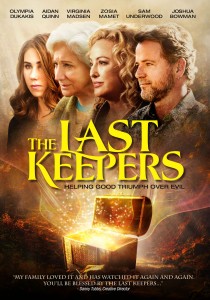 Coming on September 10: Aidan Quinn (TV’s Elementary, Unknown, Allegiance, Rushlights, The Greening of Whitney Brown) Virginia Madsen (The Hot Flashes, The Number 23, The Astronaut Farmer), Zosia Mamet (HBO’s Girls, The Kids are Alright), and Olympia Dukakis (Picture Perfect, Mr. Holland’s Opus, Moonstruck) star in “The Last Keepers.” Rhea (Zosia Mamet) is the last in a long line of female mystics who have practiced their magical traditions in secret for centuries. She lives a quiet life in the company of her parents Abigail and John (Virginia Madsen, Aidan Quinn) and grandmother Rosemarie (Olympia Dukakis). Abigail and Rosemarie each have their own individual powers, but legend has it that a chosen one will inherit all the powers of the mystics and use them to fight evil. As Rhea becomes aware of her destiny and develops her considerable gifts, she is faced with the biggest decision of her young life.
Coming on September 10: Aidan Quinn (TV’s Elementary, Unknown, Allegiance, Rushlights, The Greening of Whitney Brown) Virginia Madsen (The Hot Flashes, The Number 23, The Astronaut Farmer), Zosia Mamet (HBO’s Girls, The Kids are Alright), and Olympia Dukakis (Picture Perfect, Mr. Holland’s Opus, Moonstruck) star in “The Last Keepers.” Rhea (Zosia Mamet) is the last in a long line of female mystics who have practiced their magical traditions in secret for centuries. She lives a quiet life in the company of her parents Abigail and John (Virginia Madsen, Aidan Quinn) and grandmother Rosemarie (Olympia Dukakis). Abigail and Rosemarie each have their own individual powers, but legend has it that a chosen one will inherit all the powers of the mystics and use them to fight evil. As Rhea becomes aware of her destiny and develops her considerable gifts, she is faced with the biggest decision of her young life.
Posted on August 9, 2013 at 8:00 am
Faran Tahir comes from a family of actors. He was born in Los Angeles to Pakistani parents and studied theater at UCLA and Harvard. He has appeared in “Star Trek” and “Iron Man” and on the television series “Warehouse 13.” He talked to me about playing a bad guy (who happens to be the President) in today’s release, “Elysium.”
You play the President in this movie! That must be pretty cool.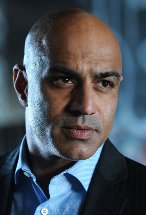
Not a bad thing to play, right! To be the leader of something. The way I look at any character is, “Can the audience, can I connect to the character?” You always build from that essential connection, making the person as human as you possibly can. When I was living with this character, I didn’t want to put the label of “good,” “bad,” or “evil” on him. I wanted him to be more of a person and let the audience decide where he lies in their minds and in the heart of the story. He is a politician so you needed to see nuance and have an angle of this politicking in dealing with issues. So that’s how I see it.
Whoever the bad guy is, he or she thinks that they’re completely justified in what they’re doing. Their actions might be perceived as bad, but to them, they’re natural. That’s just what they do. The challenge is how to step into those shoes and see the world from that perspective. Your own personal values and inclinations might play a part in it, but you do have to put them on the shelf for a little bit and just see the world from those eyes. That’s the beauty and the challenge of acting and that’s what attracts me — to see the world from someone else’s perspective. You learn a lot, and not just from the bad guy, just to see the world from a whole new set of eyes.
Was there a lot of green screen in this movie? What kind of a challenge does it create for an actor to know that whatever you are interacting with will be added later by a computer?
There was nothing but green screen! It’s very exciting because you don’t know what the final product will look like. So your imagination is working overtime to create all that in front of your eyes as much as they will later. To me, that is a lot of fun. My background is in theater and that extends itself to that kind of acting because on stage you don’t have everything in front of you. If you’re playing in “The Tempest,” you have to create that storm yourself to convey the emotions of the character. It’s when you walk on the set that the green screen is most apparent to you. But when you get into the reality of the character, it doesn’t make any difference. You’re just playing the scene, the emotion of it. A person standing and just watching — it might look very odd. But when you’re in the scene, it’s a non-issue. You are given some idea of how it’s going to look and technically, you are told, “Look over here, look over there, that’s where it’s going to be,” and you take it from there.
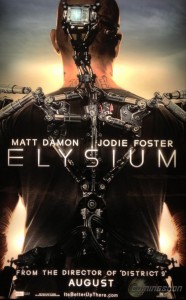 You are working with an exciting and visionary director, Neill Blomkamp.
You are working with an exciting and visionary director, Neill Blomkamp.
Neill is a genius. He has amazing vision, an amazing quality of taking hot-button issues that are current to us right now and setting them in the fictional zone so we all can examine them from all different angles. As a director, you know he knows where he wants you to go, what the vision of the film is, but there’s this amazing laid-back quality and he lets you organically find your character. He gives the trust to his actors that they will get there. He is there to guide you and stay true to his vision, but there’s never any shoving down his version. He lets you find your reality and your truth and for an actor that’s an amazing gift. He has an affinity and a connection to actors that is amazing to watch.
You’ve played a lot of villains. Who are some of your favorite movie villains?
Robert De Niro in “Taxi Driver.” He did some horrific things but there was a connection that you had with this guy, an amazing feat for someone to pull this off. He took you on the journey. You knew he was not a good guy but you trusted being led by him on that journey. That is genius, both De Niro and Scorsese.
What do you want people to talk about on the way home from “Elysium?”
This movie has something for everyone. If you’re looking for science fiction, it’s there. If you’re looking for action, it’s there. But the thing that I want people to be talking about is the way it raises some interesting and important issues and I’m hoping it sparks that conversation. No matter what side of the argument or issue you fall on, it should spark a debate.
What was it like to grow up in a family of performers?
Our dinner time conversations were sometimes about sports and all of that but a lot of time about literature, television, theater and all that. And it got heated. We all had our point of view all points of view were listened to at least. But they also had a very practical, pragmatic approach to the business of performing. There was the other side. When I wanted to become an actor, they did not try to dissuade me but their question was “Why?” They wanted to prepare me for the ups and downs of this life, how to handle success and the failures and disappointments. As a parent, you don’t want your kids to be broken people. There was a nice mix of dealing with the creative side and the practical side. My parents told me to be my own best critic. You will know when you have done a good job, a decent job, or a bad job. Listen to your own inner voice.
Posted on August 8, 2013 at 6:01 pm
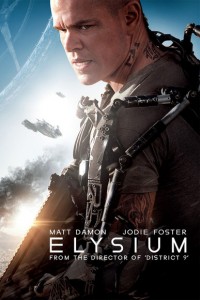 The best science fiction acts like a narrative Rorschach test, taking specific elements of our current condition, extrapolating into the future (usually dystopically), and allowing the audience to project our assumptions — and our fears — onto it. “Elysium” is a smart sci-fi thriller that bundles the action and visuals we want from big-budget sci-fi with some provocative ideas about the logical consequences of the decisions we make on some of today’s most contentious issues.
The best science fiction acts like a narrative Rorschach test, taking specific elements of our current condition, extrapolating into the future (usually dystopically), and allowing the audience to project our assumptions — and our fears — onto it. “Elysium” is a smart sci-fi thriller that bundles the action and visuals we want from big-budget sci-fi with some provocative ideas about the logical consequences of the decisions we make on some of today’s most contentious issues.
The word “elysium” means a place or condition of perfect happiness. Imagine a place of no worries, no illness, no want. There are endless, perfectly manicured green lawns and soft breezes lightly flutter the sheers on windows that look out on exquisite landscapes. That is home to the wealthy residents of “Elysium,” the space station. It orbits above the now-despoiled planet earth, where the 99 percent live Hobbesian lives that are brutal, nasty, and short. In other words, the set-up is “Wall•E” for grown-ups, without the “Hello Dolly” dance number and cruise ship atmosphere.
Max and Frey meet as children on Earth, and he promises to take her to Elysium some day. They grow up to be Matt Damon and Alice Braga, and meet again when he mouths off to a robocop, who breaks his arm, and she is a nurse in a health care system that provides only the most basic first aid for Earth residents while Elysians have access to a kind of tanning bed technology that cures all injuries and diseases and even reverses the effects of aging.
Max is exposed to a lethal dose of radiation at the plant where he works, making more robots to wait on the residents of Elysium and enforce the brutal restrictions on Earth. A robot informs Max that he will experience catastrophic organ failure and die in five days. The arrogant Elysian CEO in charge of the factory, John Carlyle (William Fitchner), is only concerned about whether Max will get the sheets dirty and how quickly he can be gone.
Max knows that breaking into Elysium and hacking into a med-bed is the only way he can stay alive. And the only way for him to get there is to do a job for his old boss, Spider (Wagner Moura), capturing some data from Carlyle. To keep Max strong, Spider’s henchmen surgically attach a cyber exo-skeletal device to his arms, spine, and skull. He gets help from Diego Luna, a highlight as Max’s old friend from the car-stealing days. It gives him extra power and a sort of USB plug in his brain. And it turns out that Frey also has a desperate reason to get to Elysium. And that the Secretary of Defense (Jodie Foster, dressed in spotless white) is in the midst of orchestrating a regime change, so the data downloaded into Max is of vital importance. She sends a scary operative with a lot of firepower (“District 9’s” Sharlto Copley, scary good) to get Max.
As he did with “District 9,” director Neill Blomkamp adds just enough allegory to this story to give extra weight to the heart-pounding action. Both of the worlds are thoughtfully conceived, especially the burned-out, graffiti-covered remains of Earth. The details are evocative and compelling — a robot asking blandly whether Max is using sarcasm, Spider’s hodgepodge lair with its hobbled-together computers. Foster’s recent performances have been disconcertingly mannered, with head-shaking to indicate the intensity of emotion. But Damon is top-notch as Max, terrific in the action scenes and even better as we see him becoming more human.
Parents should know that this film includes constant sci-fi peril and violence with some very graphic and disturbing images, many characters injured and killed, constant strong language, drugs, drinking, and smoking.
Family discussion: What elements of this story are based on current issues and controversies? Why did Max say no to Frey? Why was the story about the meerkat and the hippo important? What will happen next?
If you like this, try: “Upside/Down” and “Mad Max”
Posted on August 8, 2013 at 6:00 pm
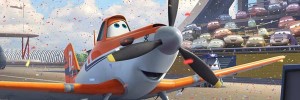 “Planes” literally takes off from the retro world of “Cars” and “Cars 2,” with the story of a brave little crop-duster named Dusty (Dane Cook) who wants to compete in an international air race. A couple of problems for Dusty: he was not designed for racing and he is afraid of heights. A couple of problems for the movie: originally intended as a straight-to-DVD release: it does not have the narrative or emotional impact we expect from a feature film and a misguided flashback with a WWII air battle is jarring and likely too much for the intended audience of young gearheads.
“Planes” literally takes off from the retro world of “Cars” and “Cars 2,” with the story of a brave little crop-duster named Dusty (Dane Cook) who wants to compete in an international air race. A couple of problems for Dusty: he was not designed for racing and he is afraid of heights. A couple of problems for the movie: originally intended as a straight-to-DVD release: it does not have the narrative or emotional impact we expect from a feature film and a misguided flashback with a WWII air battle is jarring and likely too much for the intended audience of young gearheads.
The modest ambitions for this movie are refreshing in a summer of over-plotted movies for kids. It is a very simple “little engine that could” story (hmmm, could the next installment be “Trains?”), set, like “Cars,” in a charmingly imagined world of anthropomorphized modes of transportation where even the Statue of Liberty is a machine. It wastes no time giving us the histories of the characters and gets right down to it. Dusty may be built for seed, not speed,” but he wants to race. In his dreams, he has soared near the stars, but in reality he flies “low and slow,” dusting crops. He gets a lot of support from his friends, a practically-minded forklift named Dottie (sweetly voiced by Teri Hatcher) and a loyal fuel truck named Chug (Brad Garrett), who has a copy of “Air Racing for Dummies.”
There is a qualifying race for the Wings Around the World event, and Dusty is determined to participate. He barely makes it into the top five, only after the plane ahead of him is disqualified for the aviation equivalent of doping. He knows he will need more help if he is going to compete in the big event. He asks a WWII Naval plane called Skipper (gravelly voice of Stacy Keach) to be his coach. Skipper himself has not flown since the war, but he knows that “races are won by skill, not speed” and “it’s not how fast you fly; it’s how you fly fast.” He also knows about things like torque, lift, drag, turn ratios, and wind shear.
Dusty enters the race and meets his international competition, including the arrogant champion, Ripslinger (Robert Craig Smith), the lovely Asian champ Ishani (Priyanka Chopra), the British Bulldog (John Cleese), who always has a cup of tea at hand, or, I should say, at wing, the colorful Mexican Chupacabra (Carlos Alazraqui), whose design is inspired by a Mexican wrestler’s mask, and the French Canadian Rochelle (Julia Louis-Dreyfus), with whom Chupacabra is instantly smitten. Dusty is determined to win the race his way — by flying low and holding on to his crop-spraying equipment. But he will have to bend on both to stay in the race.
Each leg of the journey presents different challenges, but all present stunning vistas. There are some slow patches without the detailed characterization of the community and characters we saw in the original “Cars.” And, as noted, a diversion into Skipper’s backstory is poorly conceived and out of sync. It seems a bit off to make fun of merchandising when it comes across as more of an informercial for the very products it pretends to spoof. But the obvious affection for the mechanics of aviation and the dream of doing more than you are built for keeps things aloft.
Parents should know that this film has some potty humor, a brief WWII battle scene flashback with a reference to the loss of some characters, and some peril.
Family discussion: What can you do that goes beyond what you were “built for?” Why did Dusty help Bulldog?
If you like this, try: “Cars” and “Those Magnificent Men in Their Flying Machines”